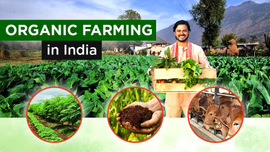Rooftop Farming in India: Requirements, Advantages & Limitations

The increasing urbanization threatens vital agricultural land, demanding innovative solutions for food security and climate resilience. Further, the increasing use of agricultural land is contributing to greenhouse gas emissions. These together necessitate the need to adopt alternative agricultural practices such as rooftop farming, which is gradually gaining importance in urban areas of India. In this blog, we will discuss the concept of rooftop farming in India, the conditions required for it, rooftop farming advantages, etc.
Table of Contents
- What is Rooftop Farming?
- What are the Requirements for Rooftop Farming?
- How to Start Rooftop Farming?
- What are the Advantages of Rooftop Farming?
- What are the Limitations of Rooftop Farming?
What is Rooftop Farming?
Rooftop farming is a man-made green space created on the roof of an industrial, residential, or commercial building. It is a type of organic farming, mostly practiced in urban areas. There is an ample amount of space on rooftops and balconies with enough water and sunlight and all the ideal conditions to grow fruits and vegetables such as tomatoes, green chilli, potato, capsicum, garlic, etc.
Rooftop farming, when executed with proper planning and innovative structural designs, results in the formation of a flourishing plantation in limited space. This urban farming method offers shade or shelter, or simply a green area on the terrace.
What are the Requirements for Rooftop Farming?
- A thin shade of cloth or netting is needed to provide some protection for the crops. The terrace surface also becomes a critical aspect as the dark surface absorbs more sunlight and produces a hot or arid environment.
- Good quality seeds and suitable pots and containers are required to grow better crops in rooftop farming.
- Organic manure such as FYM/Leaf compost/Neem cake should be used along with inorganic fertilizers.
- The roof plantation should be established with good water retention. The soil should be amended with vermiculite in small amounts for good water retention capacity.
- Self-water containers can also be used to keep the soil moist. These containers don’t require as much attention as traditional water containers.
- A layer of mulch can also be used and evenly spread over the soil surface to care for moisture loss.
How to Start Rooftop Farming?
The rooftop farming in India requires the following steps to get started:
Step 1: You need to learn about the rental property rules, homeowner organization regulations, or local ordinances regarding rooftop farming. It is important to know whether they are prohibited or require special treatment before investing your money.
Step 2: Get the advice of a contractor or architect about whether the building is safe for rooftop farming. Once you know its capacity, and make sure it is leakage free, you can plan the next step accordingly.
Step 3: Now, you need to design the rooftop structure considering the capacity of the building. Try to use lightweight materials, such as fibreglass, plastic, or foam planting containers, and avoid using pavers. Use lightweight potting soil instead of garden dirt.
Step 4: You need to consider that a rooftop garden will be windier than a normal garden because of its height. So, you need to use trellises or latticed windbreaks, which can disrupt the flow of wind rather than completely stopping it.
Step 5: Lastly, you need to install a water source to water your rooftop garden, as the garden requires more water in hot weather conditions. You can install an automatic watering system or construct a water storage system for your rooftop garden.
What are the Advantages of Rooftop Farming?
Providing employment opportunities, use of kitchen waste as an organic fertilizer, food security, etc. are some of the advantages of practicing rooftop farming. Let’s understand in more detail.
- It provides an income source and employment for the local people.
- The utilization of kitchen waste, such as vegetable waste and more, acts as an organic fertilizer in rooftop gardens.
- It ensures food security by offering fresh, safe, and healthy food sources.
- Rooftop farming advantages also include that the rooftop garden enhances socializing and local community participation. It acts as a social hub and an educational platform for the neighbour hood community.
- It is a less time-consuming activity which can be managed with other jobs.
- It supports health by decreasing the amount of carbon dioxide and increasing the oxygen level. Additionally, it also helps with heat reduction in urban areas.
What are the Limitations of Rooftop Farming?
- Rooftop farming requires a large amount of water for crops, but the water is already scarce in urban areas of India.
- Generally, the terraces of buildings in urban areas are not built as per the requirements of rooftop farming. They may require reinforcements and waterproofing, which may increase the cost of rooftop farming.
- Rooftops are more prone to high winds, heat, and temperature, which may damage crops, affecting productivity.
- Funding and shortage of skilled labour is another limitation of rooftop farming.
Frequently Asked Questions On Rooftop Farming in India
1. What is rooftop farming?
Rooftop farming is the practice of building a green area on the terrace of a commercial, industrial, or residential building.
2. Can rooftop farming be profitable?
Yes, growing fruits and vegetables on the rooftop is profitable as it provides an additional source of income.
3. How to build a rooftop farm?
A rooftop farm should be built with proper planning and innovative structural designs, offering shade or shelter, a play space, or a green area on the terrace.
4. Is rooftop farming safe?
Yes, rooftop farming is safe if practiced with proper safety measures.


Related Blogs












